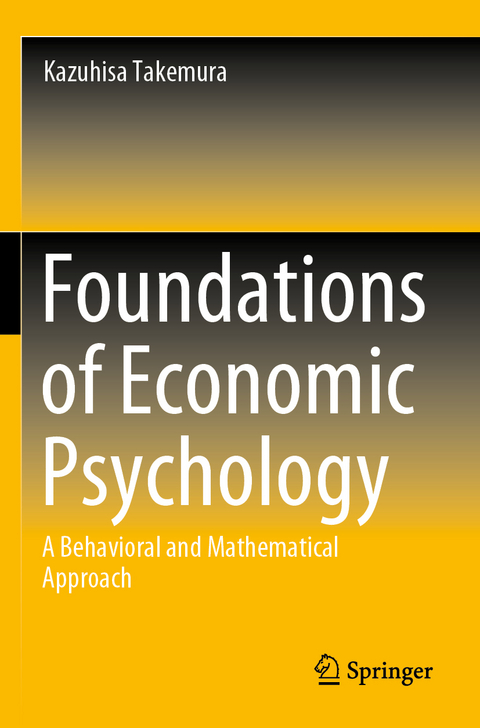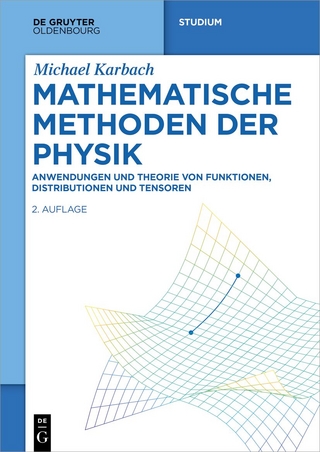
Foundations of Economic Psychology
Springer Verlag, Singapore
978-981-13-9051-7 (ISBN)
The book explains the numerous behavioral and mathematical models of economic psychology related to micro- and macroeconomic phenomena that have been proposed in the past, and introduces new models that are useful to explain human economic behaviors. It concludes with speculations about the future of modern economic psychology, referring to its connection with fields related to neuroscience, such as neuroeconomics, which have been developed in recent years.
Readers require no advanced expertise; nonetheless, an introductory understanding of psychology, business administration, and economics, and a high- school-graduate level of mathematics are useful. To aid readers, each chapter includes a bibliography, which can be referred for more details related to economic psychology.
Kazuhisa Takemura is a Japanese psychologist and educator. Besides serving as a professor at the Department of Psychology, Waseda University, he is also director of the university’s Institute for Decision Research, a professor at the Waseda MBA school, and a research fellow at the Waseda Research Institute for Science and Engineering. He received his B.A. and M.A. from the Department of Psychology, Doshisha University, in 1983 and 1985, and received his Ph.D. (System Science) from Tokyo Institute of Technology in 1994, and an additional Ph.D. (Medical Science) from Kitasato University in 2013. He has also worked abroad as a visiting researcher at: James Cook University, La Trobe University, and Australian National University (Australia); the Tinbergen Institute (the Netherlands); Gothenburg University and Stockholm University (Sweden); the University of Konstanz (Germany); and National Cheng Kung University (Taiwan). Hewas also a Fulbright Senior Researcher at the Department of Social and Decision Science, Carnegie Mellon University (USA) from 1999 to 2000, and a Visiting Professor at the Department of Psychology, St. Petersburg State University (Russia) in 2008. His main research area is human judgment and decision-making, especially the mathematical modeling of preferential judgment and choice. He received a Hayashi Award (Distinguished Scholar) from the Behaviormetric Society in 2002, an Excellent Paper Award from Japan Society of Kansei Engineering in 2003, Book Awards from the Japanese Society of Social Psychology (in 2010) and the Behaviormetric Society (in 2016), and a Fellow Award from the International Association of Applied Psychology in 2018. In the course of his career, he has taught extensively on behavioral decision theory, marketing, economic psychology, consumer behavior, social psychology, and psychometrics at many universities (Tokyo University, Osaka University, University of Tsukuba, Kobe University, Nagoya University, Tokyo Institute of Technology, Gakushuin University, Rikkyo University, Tokyo International University, and St. Petersburg State University).
Preface.- Chapter 1. What Is Economic Psychology?:The Perspective of Economic Psychology and the Research Framework.- Chapter 2. Rational Choice and Revealed Preference:Theoretical Representation of Preference Relations Leading to the Best Choice.- Chapter 3. Expected Utility Theory and Economic Behavior:Predicting decision-making based on the expected value of utility.- Chapter 4. Nonlinear Utility Theory and Prospect Theory:Eliminating the paradoxes of linear expected utility theory.- Chapter 5. Mental Accounting and Framing:Framework of Decisions in Consumer Price Judgment.- Chapter 6. Multi-attribute Decision-making Process in Economic Behavior:Process Tracking of Decision-making and Computer Simulation.- Chapter 7. Deployment on the Interaction Research of Economic Behavioral Game Theory and Problems of Happiness.- Chapter 7. Consumers’ Preference Construction, Affects and Neuroscientific Research:Research on Consumer’s Preference and Neuromarketing.- Appendix.
| Erscheinungsdatum | 17.08.2020 |
|---|---|
| Zusatzinfo | 57 Illustrations, color; 42 Illustrations, black and white; XXIII, 288 p. 99 illus., 57 illus. in color. |
| Verlagsort | Singapore |
| Sprache | englisch |
| Maße | 155 x 235 mm |
| Themenwelt | Mathematik / Informatik ► Mathematik ► Angewandte Mathematik |
| Mathematik / Informatik ► Mathematik ► Finanz- / Wirtschaftsmathematik | |
| Wirtschaft ► Betriebswirtschaft / Management ► Unternehmensführung / Management | |
| Wirtschaft ► Volkswirtschaftslehre ► Mikroökonomie | |
| Schlagworte | Behavioral Economics • Consumer Behavior • Decision Theory • economic psychology • Marketing |
| ISBN-10 | 981-13-9051-7 / 9811390517 |
| ISBN-13 | 978-981-13-9051-7 / 9789811390517 |
| Zustand | Neuware |
| Haben Sie eine Frage zum Produkt? |
aus dem Bereich


